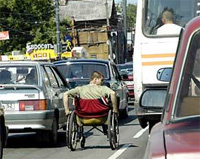On December, 3rd the International Day of Disabled Persons was celebrated in the Russian Federation. In the Russian Federation there are 12.4 million disabled persons, that is almost 10 percent of the population and their number is steadily increasing. In spite of the fact that in 1992 the Russian Federation signed UN documents concerning rights of disabled persons they still live under miserable conditions. (10-DEC-06)
Text: HRH/Moscow, by Yanina Savenko. Sources: primamedia.ru, vesti.ru, dvinainform.ru, ami-tass.ru, who.int, un.org, hro.org. Photos: tltnews.ru, 2006.novayagazeta.ru, nnews.nnov.ru
The theme for this year’s International Day of Disabled Persons was accessibility to information technologies, and the day was called E-Accessibility Day. Persons with disabilities are at a considerable disadvantage by not being able to access information technologies. For instance, as education becomes increasingly dependent on information technologies inability to access the Internet for example limits the learning potential of disabled persons. However, in the Russian Federation a problem of E-Accessibility is the problem for remote future, first of all, because many basic rights of disabled persons are being violated… and also because even for healthy people living in villages informational technologies are inaccessible.
 Disabled persons are put into “home reservations”
Disabled persons are put into “home reservations”
Disabled persons’ employment is unjustifiably low: only 10 percent of disabled persons work. Since the 1st of January 2005 the law on monetization cancels benefits for physically disabled persons – they don’t receive grants for buying cars and the state doesn’t reimburse car exploitation expenses any more. Invalids on wheel-chairs can’t use public transport and a private car is the only means of transportation for them. “I believe that the law on benefits’ monetization violates our constitutional rights to freedom of movement, to education and employement”, said Elena Leontieva, leader of non-governmental organization of invalids on wheel-chairs – “Free Movement”.
Rights of people with mental disorders
Psychiatrists from the whole country express unanimous indignation of the fact that in September 2006 the most effective medicines for mentally ill disabled persons were excluded from the list of free drugs – particularly, depot injections which guarantee from exacerbation for 2-4 weeks. “We witness that a state structure calling itself as the Ministry of Public Health and Social Development proclaimed as the main priority not the population’s health but funds saving”, said Yury Savenko, President of the Independent Psychiatric Association.
Violation of disabled children rights
The state policy concerning mentally retarded children is based on priority of their withdrawing from the society and putting them in closed institutions. According to check-ups, made by representatives of the Ombudsman for  Human Rights in the Russian Federation together with members of human rights organizations during 2005, in mental boarding schools across the Russian Federation there are many children who haven’t lost a capability for self-service. Furthermore, such children are used as free labor force, for example, for making repairs, cleaning toilets and work in subsistence farming. “In some boarding schools children rights to personal immunity, as well as right to protection from physical and psychological violence, violent treatment, exploitation and use of methods abasing human dignity – are being seriously violated”, said Ombudsman Vladimir Lukin. Besides, disabled children’ right to education is being seriously violated, especially for disabled children with mental disorders or with mental retardation, very often they are unjustly declared unable to learn. For example, in 2004 in Tumenski region from 2082 children with mental disorders and with mental retardation only 50 studied on school program, in Krasnodarsky region from 1194 – only 70 and in Stavropolski region – just 36.
Human Rights in the Russian Federation together with members of human rights organizations during 2005, in mental boarding schools across the Russian Federation there are many children who haven’t lost a capability for self-service. Furthermore, such children are used as free labor force, for example, for making repairs, cleaning toilets and work in subsistence farming. “In some boarding schools children rights to personal immunity, as well as right to protection from physical and psychological violence, violent treatment, exploitation and use of methods abasing human dignity – are being seriously violated”, said Ombudsman Vladimir Lukin. Besides, disabled children’ right to education is being seriously violated, especially for disabled children with mental disorders or with mental retardation, very often they are unjustly declared unable to learn. For example, in 2004 in Tumenski region from 2082 children with mental disorders and with mental retardation only 50 studied on school program, in Krasnodarsky region from 1194 – only 70 and in Stavropolski region – just 36.
The state cares for disabled persons once a year
Celebrating the International Day of Disabled Persons came to nothing  more than official congratulations and public assistance to the neediest disabled persons. Only in a few cities activists organized various holiday and charitable actions – such as gifts, concerts, competitions, performances for disabled persons (Pskov, St. Petersburg, Moscow, Yuzhno-Sakhalinsk). When the holiday was over disabled persons disappeared from our life again, although the aim of this holiday was to change society’s attitude toward disabled persons and to eliminate obstacles to their full participation in all spheres of life. Victor Shenderovich, well-known journalist and human rights activist, said that our society prefered to forget immediately about their existence and Moscow mafia used disabled persons without legs and hands demonstrating them in metro as beggars.
more than official congratulations and public assistance to the neediest disabled persons. Only in a few cities activists organized various holiday and charitable actions – such as gifts, concerts, competitions, performances for disabled persons (Pskov, St. Petersburg, Moscow, Yuzhno-Sakhalinsk). When the holiday was over disabled persons disappeared from our life again, although the aim of this holiday was to change society’s attitude toward disabled persons and to eliminate obstacles to their full participation in all spheres of life. Victor Shenderovich, well-known journalist and human rights activist, said that our society prefered to forget immediately about their existence and Moscow mafia used disabled persons without legs and hands demonstrating them in metro as beggars.





